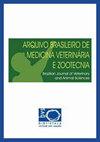The correlation between body weight, body weight gain and blood parameters in pigs at birth and weaning
IF 0.5
4区 农林科学
Q4 VETERINARY SCIENCES
Arquivo Brasileiro De Medicina Veterinaria E Zootecnia
Pub Date : 2023-03-01
DOI:10.1590/1678-4162-12795
引用次数: 0
Abstract
ABSTRACT The aim of study was to determine the relationship between metabolic parameters, body weight and body growth of piglets at birth and weaning. The experiment included 80 piglets obtained from F1 generation sows. Body weight was measured at birth (BW0), 24h (BW1) after birth and on day 25 (at weaning, BW2). Blood sampling was performed at the beginning of life (3rd day after birth) and at weaning (21st day after birth). BW0 and BW1 positively correlated with cholesterol and negatively with urea values at the beginning of life and RBC values at weaning. BW2 positively correlates with albumin and cortisol values at the beginning of life, total proteins, and globulins at weaning, and negatively correlates with erythrocyte values at weaning. Piglet growth from birth to weaning (BWG2-0) correlates positively with total proteins, albumin, and cortisol at the beginning of life and total proteins at weaning. ROC analysis shows that MCHC, TPROT, GLOB, CHOL and AST at the beginning of life can distinguish fast-growing from slow-growing piglets from birth to weaning period. The use of blood parameters enables early recognition of growth rate in piglets, which can help to optimize all further steps to achieve the best possible growth.猪出生和断奶时体重、增重与血液参数的相关性
摘要本研究的目的是确定仔猪出生和断奶时代谢参数、体重和身体生长之间的关系。试验包括从F1代母猪中获得的80头仔猪。在出生时(BW0)、出生后24小时(BW1)和第25天(断奶时,BW2)测量体重。在出生之初(出生后第3天)和断奶时(出生后21天)进行血液取样。BW0和BW1与胆固醇呈正相关,与生命开始时的尿素值和断奶时的红细胞值呈负相关。BW2与生命开始时的白蛋白和皮质醇值、断奶时的总蛋白和球蛋白呈正相关,与断奶时的红细胞值呈负相关。仔猪从出生到断奶的生长(BWG2-0)与生命初期的总蛋白、白蛋白和皮质醇以及断奶时的总蛋白呈正相关。ROC分析表明,从出生到断奶期,生命初期的MCHC、TPROT、GLOB、CHOL和AST可以区分快速生长和缓慢生长的仔猪。血液参数的使用能够早期识别仔猪的生长速度,这有助于优化所有进一步的步骤,以实现最佳的生长。
本文章由计算机程序翻译,如有差异,请以英文原文为准。
求助全文
约1分钟内获得全文
求助全文
来源期刊
CiteScore
0.80
自引率
25.00%
发文量
111
审稿时长
9-18 weeks
期刊介绍:
Publica artigos originais de pesquisa sobre temas de medicina veterinária, zootecnia, tecnologia e inspeção de produtos de origem animal e áreas afins relacionadas com a produção animal. Atualmente a revista mantém 628 permutas (419 internacionais e 209 nacionais), sendo um verdadeiro suporte para o recebimento de periódicos pela Biblioteca da Escola.
A partir de 1999, a Escola de Veterinária delegou à FEP MVZ Editora o encargo do gerenciamento e edição de todas suas publicações, inclusive do Arquivo, ficando somente com o apoio logístico (instalações, equipamentos, pessoal etc.). O apoio financeiro é exercido pelo CNPq/FINEP e pela própria FEP MVZ.

 求助内容:
求助内容: 应助结果提醒方式:
应助结果提醒方式:


